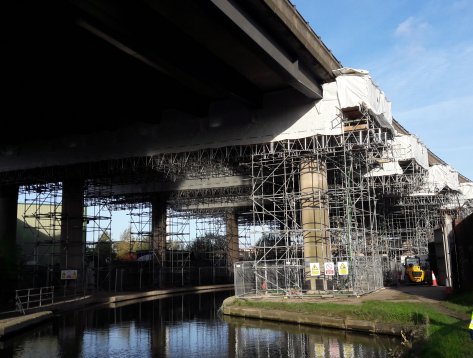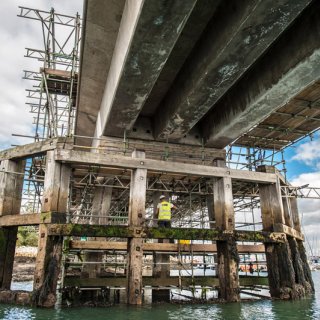Major works carried out to Birmingham's 'Spaghetti Junction'
CRL were employed as the principal subcontractor to Kier Highways, within the Highways England Area 9 framework. The works involved resonance testing of all the existing concrete surfaces to the bent structures, multi-phased concrete repairs, hydrodemolition and surface preparation, installing an Impressed Current Cathodic Protection (ICCP) system, sprayed concrete to the beams and installation of a new AC electrical power supply circuit to power the ICCP system. The project extended over 12
number cross-head structures that support the A38 Aston Expressway, leading off from Spaghetti Junction. The increased scope of works, lead to an increased programme of 18 months
duration and a final outturn project sum of £6.2m.
Before the ICCP system installation could begin, high level access scaffolds, boarded out with timber and Monarflex sheeting had to be constructed to exacting safety standards to ensure safe working
both for our large workforce, as well as for the other stakeholders utilising the main site access track and the adjacent roads. The CRL site team carried out a high number of stages of concrete
repairs to each of the cross-beams as well as the tops of the corresponding supporting columns. As strict rules were applied by the client’s engineers with respect to the size and their locations,
this work took much longer than initially envisaged in the tender programme.
Following the concrete repairs, CRL then installed a total of 156 Ag/AgCl/0.5M KCI Reference electrodes into the crosshead structures, fixed 188 negative connections to the steel, spot welded
188 positive connections to the anode ribbon and pinned some 1,790 metres of ribbon anode to the surface prepared parent concrete, to create the ICCP system as prescribed on the drawings. In addition to this, CRL were also instructed to install an additional 35 discrete anodes of a differing design, where the original design of the ribbon anode was not feasible to locate, due to an electrical duct obstructing one of the faces on each of 3 cross-head structures.
Throughout all the work, a large amount of system testing was carried out and recorded to ensure that the ICCP installation was working as expected. This included half-cell testing, steel continuity testing, dis-continuity checks of the steel and anode and dis-continuity checks between zones of the anode
and reference cells.
Other works inlcuded hydrodemolition, concrete spraying, steel beam painting, welding and ultimately, our electrical subcontractor to wire all our completed components into the Transformer
Rectifier Units. The energisation of the P64 ICCP system was carried out on the 3rd June and our CP Level 4 Engineer is continuing to monitor the system to ensure that it is working as expected, to it’s full potential and to our Clients satisfaction.

“Well done to the site team; a great result and delivered on time.”
Colin Jackson | Delivery Manager | Highways England
























